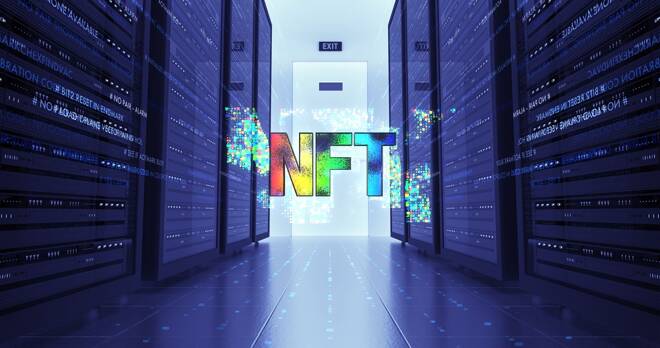Advertisement
Advertisement
After Polygon Collaboration, Looking Glass Labs Establishs Itself as a Leading Metaverse Company
By:
Looking Glass Labs (NEO: NFTX) announced on March 3 that its flagship studio, House of Kibaa ("HoK"), has formed a partnership with Polygon Studios. The company aims to grow its NFT and Metaverse portfolio through this relationship.
Looking Glass Labs is a Web3 technology platform based in Vancouver that specializes in NFT architecture, play-to-earn tokenization, virtual asset royalty streams, and immersive XR metaverse design. The company’s portfolio includes Play-to-earn (P2E) Game, Project Origin, House of Kibaa, $HOK Utility Token, and 2Virtual Asset Portfolio.
The company, through its leading brand, House of Kibaa (“HoK”) digital studio, is now constructing its own metaverse, which has the potential to gain market share from many different players in the NFT world. HoK creates and curates next-generation 3D-rigged assets that allow for the simultaneous existence of functional art and collectibles across diverse NFT/metaverse spaces.
Looking Glass is developing a marketplace for artists to create and sell 3D assets, with a strong emphasis on social interaction allowing several users to communicate simultaneously in the same space. LGL is also building a virtual museum as well as 20 different landscapes inspired by the real world.
Digital Land Sale is Coming
The company is planning a digital land sale in Q2 2022, a sale that will serve as a portal to HoK’s Project Origin metaverse frontier. HoK also plans to design structures such as galleries and shops that may be placed on property to display or monetize users’ collections. In May 2021, HoK launched Genesis Membership which gives a member lifetime access to monthly airdrops of HoK-produced digital assets, secret discord access, and early access to future releases.
HoK sold the first minted Genesis Memberships for $500 each, netting US$490,000 over four weeks and its resale value on the secondary market reached $11,359 as of January 27, 2022, a price increase of almost 2,000% in just 9 months. HoK’s secondary royalty streams NFT drops, and membership sales have generated over $7 million in revenue as of January 2022.
On September 20, 2021, HoK released GenZeroes, a generative series of 10,000 unique 3D avatars that sold out in only 37 minutes for a total of CAD 6.2 million, with a perpetual 5% royalty stream on secondary market sales. LGL is now working on GenZeroes, the first live-action show based on NFTs, and in 2022, the company aims to build a hyper-realistic metaverse based on the current Unreal Engine version.
NFTs, Metaverse, and Polygon
As the world of NFT grows in popularity, so does the interest in the metaverse. The concept of a 3D environment has long been a part of the gaming industry, but it is now finding its way into other markets such as fashion, social media, architecture, entertainment, and sports. Polygon is one such platform that is helping to advance NFT and blockchain technologies by allowing developers to create scalable DApps (decentralized apps) with low transaction fees and high security.
Polygon has created several fintech solutions for traditional finance, cryptocurrency, and blockchain. Its scaling solution is built on top of the Ethereum blockchain, capable of processing up to 65,000 transactions per second at fees as low as a fraction of a cent plus network fees.
Since Polygon’s launch in 2017, the platform has had over 7,000 DApps, with more than 130 million unique users, and over 3 million daily transactions. With the help of Polygon Studios and its gaming and NFT arm, HoK will be able to expand its userbase and gain access to Polygon’s unique users in different industries.
HoK will get technical and business support for its strategic pillars including HoK, the GenZeroes NFT collection, the GenZeroes live-action series, and HoK’s Project Origin metaverse, which is expected to launch in 2022.
Polygon Studios will also assist HoK and its projects by exploring new collaboration opportunities with Polygon Studios’ clients and collaborators, as well as reposting HoK’s material on its social media channels, including the Polygon Twitter account, which has over 1.2 million followers.
Commenting on this positive development, Dorian Banks, the Chief Executive Officer of LGL, said:
“Establishing a formal collaboration with Polygon is expected to create a number of exciting opportunities for our Company as digital media continues its rapid shift towards NFTs and the metaverse in 2022. Further, we believe there is considerable value to be had from potential arrangements with Polygon’s well-known collaborators in other industries such as technology, entertainment, sports, and video gaming. ”
The strategic collaboration is a commendable long-term initiative that will help Looking Glass Labs scale up while also increasing the value HoK generates for its platform and other NFT communities.
About the Author
Joshua Horowitzcontributor
Joshua Horowitz is a serial investor, consultant and analyst. He has been an active VC Investor and Day trader for over ten years. His areas of expertise Cannabis, Blockchain, Biotech and Medtech.
Advertisement
